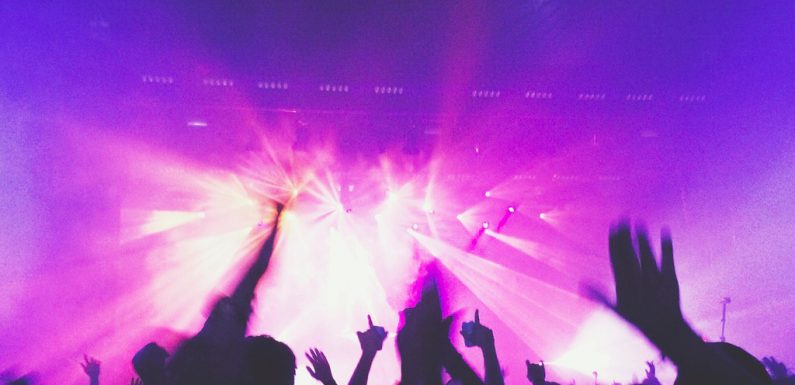
With glitter splattered on our faces and beers in our hands, my friend Jessie and I weaved through the crowd searching for the perfect spot— far enough back that we’d have enough space to dance and close enough to be able to actually see Skrillex when he came on stage.
We snapped pictures, drank our drinks and danced to “Red Lips.” Like all of the shows we’d been to before, we were having a great time. And like all the shows we’d been to before, some guy got too comfortable.
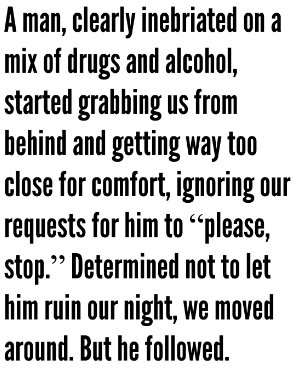
A man, clearly inebriated on a mix of drugs and alcohol, started grabbing us from behind and getting way too close for comfort, ignoring our requests for him to “please, stop.”
Determined not to let him ruin our night, we moved around. But he followed. Finally, two guys around our age offered us help. One stepped in, told the guy we were their girlfriends, said he needed to leave us alone and stood behind us the rest of the night- with a comfortable and respectable amount of space between us.
Having more respect for another man’s request than ours, he finally left us alone. We were fine and went on to have an incredibly fun night, but others’ stories don’t end so well.
At Woodstock ’99, a volunteer reported witnessing two gang rapes in the mosh pit of a Korn show. In 2012, a woman reported being raped and robbed at Outside Lands Music and Arts Festival over a long period of time. In 2014, a 17-year-old was allegedly raped at a Keith Urban concert in Massachusetts while most surrounding concertgoers did nothing to stop it, and instead recorded the instance on their cell phones until one woman pushed the man off of her.
No event performers are free from sexual assault. At a concert in 2013, a member of the audience slapped Beyoncé’s butt while she performed. In 2014, Iggy Azalea reported members of her crowd attempting to finger her while she crowd surfed, and has since had to upgrade her security measures. Type “sexual assault” or “rape” alongside the name of any festival or concert into your Google search bar and you’ll find multiple occurrences in a matter of seconds.
It’s not uncommon, it’s not a new phenomenon, but it needs to be addressed, and it needs to stop.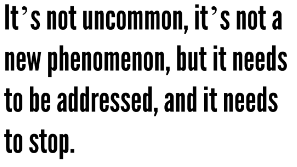
Ask any girl that’s been to a concert or festival and she can probably tell you a story of being made uncomfortable by someone’s unwanted attention, unwelcome hands, or any form of sexual harassment. If not, she can probably give you a secondhand story of a friend that has. With the combination of crowds, low security, alcohol, and drugs, sexual assault at these events is incredibly common.
Like in most cases outside of festivals and concerts, sexual assaults at these events are underreported. Shame, embarrassment, fear of punishment for using alcohol or drugs, and self-blame, prevent victims from reporting these crimes and seeking help.
Large crowds allow perpetrators to remain anonymous and get lost quickly without victims being able to establish their identity or appearance. The bystander effect prevents witnesses from offering help or reporting what see, in beliefs that with so many other people around, someone else will do something.
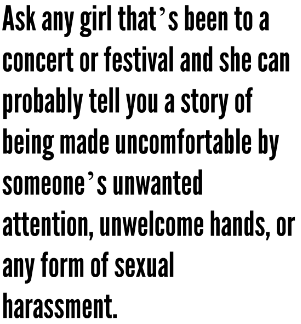 Music festivals and concerts are often attached to this idea of a utopian environment where everyone is happy, carefree and kind. It’s easy to let your guard down and expect others to be at these events for the same reason as you- the music. But, in crowds of thousands, there are bound to be a few with ulterior motives.
Music festivals and concerts are often attached to this idea of a utopian environment where everyone is happy, carefree and kind. It’s easy to let your guard down and expect others to be at these events for the same reason as you- the music. But, in crowds of thousands, there are bound to be a few with ulterior motives.
We shouldn’t have to avoid enjoying music and dancing and having a good time in fear of being taken advantage of. We can take the precautions we’ve been given the entirety of our lives- stay with friends, don’t accept drinks from strangers, and remove ourselves from any situation when we start to feel uncomfortable. We can do our part to help if we see someone in need and not expect others to step in before us. But these things are merely a small band-aid on a much larger cut.
Rape culture and festival culture seem to have become so entwined that many choose to accept the problem as normal rather than call attention to it and change it. We’re told that we should expect some unwanted contact with others when in a large crowd of dancing bodies, but there’s a difference between accidentally brushing up against a stranger in close quarters and purposefully making sexual advances on them.
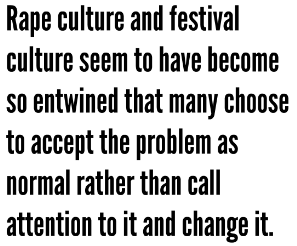
Anyone that’s ever experienced such can definitely tell the difference. We’re told it’s the outfit choices, as festival attire can often be minimal and revealing. As if slut shaming has ever created a positive outcome for any situation. We’re told it’s the alcohol or the drugs that some attendees choose to partake in. But here’s the thing- no drink, no drug, no clothing, and definitely no proximity issue is an invitation for sexual assault.
Groups like Girls Against have taken measures to bring attention to sexual assault at concerts, but we all can do our part to draw attention to this issue. With music festivals becoming more and more popular every year, it’s time we stop ignoring this problem and find a way to put an end to it.









